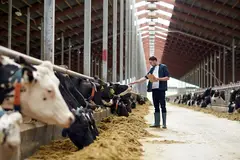
- Industry news
Industry news
- Category news
Category news
- Reports
- Key trends
- Multimedia
- Journal
- Events
- Suppliers
- Home
- Industry news
Industry news
- Category news
Category news
- Reports
- Key trends
- Multimedia
- Events
- Suppliers
Key takeaways
- Nestlé is collaborating with the World Farmers’ Organization to promote sustainable farming practices to boost food systems’ resilience to climate change.
- The move focuses on improving dairy supply chains and supporting farmers in adapting to climate change-related challenges.
- The partnership aims to inspire future farmers by co-developing practical farming models prioritizing sustainability and food security.

Nestlé has teamed up with the World Farmers’ Organization (WFO) to increase food systems’ resilience to climate change by supporting and spreading awareness of sustainable farming methods such as regenerative agriculture.
The initiative is hailed as the “first-ever” association between a global food firm and the largest global farmers’ association. It aims to support farming communities, rural economies, and international food security.
The partnership comes as climate change continues to batter crops worldwide, driving F&B companies to increasingly turn toward agricultural practices that support farmers in adapting to the impact of fluctuating temperatures and erratic rains.
The move aims to recognize farmers’ challenges, strengthen their capacities, and co-develop practical farming models that can “inspire and attract the next generation of farmers,” says Nestlé. It is primarily focused on dairy supply chains.
“Farmers are facing the challenges of climate change every day, but they are also driving the solutions. Real change demands holistic approaches and collaboration across the value chain,” says Arnold Puech d’Alissac, president of WFO.
“This partnership with Nestlé aims to lead by example, showing how farmers and industry can work together, with trust and respect, to build food systems that are fair, resilient, and sustainable for people and the planet.”
Farmer-first approach
By partnering with the WFO, Nestlé aims to “put farmers at the center” and share their insights and concerns to help inform food policies, says Chris Hogg, global head of Public Affairs at Nestlé.
“Nestlé relies on 600,000 farmers globally to ensure a sustainable supply of its raw materials. Farmers, who are deeply aware of today’s crop production challenges, are highly proficient at adapting and finding ways to work with the planet’s natural resources to produce food.
The WFO represents over one billion farmers globally from national organizations and agricultural cooperatives in over 50 countries. The organization supports action on climate change from the start to advance regenerative and climate-resilient agriculture.
Earlier this year, a UK study predicted that by 2080, climate change would make the region suitable for growing oranges, chickpeas, and okra, which usually grow in warmer climates. Meanwhile, crops like onions and oats might become “harder to grow.”
Researchers emphasize that regenerative agriculture can help combat global issues like soil degradation, climate change, and ecological decline. They describe the practice as a “new paradigm” grounded in systems thinking and environmental reciprocity.











